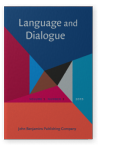Split voices in political discourse
In this paper, I consider dialogue in Parliament as central, because it is the dialogic instances that bring to the fore the multivocality of political discourse, and I will show there are “other voices [speaking] through the speaking voice” (Ionescu-Ruxăndoiu 2012, 152). I also start from the premise that, although restrictive and context dependent, in political discourse one may identify instances of the self. Politicians exploit language use with the purpose of creating emotions in their audience and their aim is to influence public opinion, to make voters think he/ she is “the right man at the right time”. Using extracts from the speeches delivered by a controversial Romanian politician, Corneliu Vadim Tudor, I will dwell upon the active management of voices in discourse as well as on projection of self into discourse with a view to discussing them as strategies used to construct a politician’s professional identity.
References
Bakhtin, Mikhail
1982 Probleme de literatură şi estetică. Bucureşti: Univers.

Bakhtin, Mikhail
1984 Problems of Dostoevsky’s Poetics. Ed. and trans.
Caryl Emerson. Minneapolis: University of Minnesota Press.


Berlin, Lawrence N., and Anita Fetzer
Billig, Michael
2005 Laughter and Ridicule: Towards a Social Critique of Humour. London: Sage.

Brown, Penelope, and Stephen Levinson
1987 Politeness: Some Universals in Language Usage. Cambridge: Cambridge University Press.


Cap, Piotr
2005 “
Language and Legitimization: Developments on the Proximization Model of Political Discourse Analysis”.
Lodz Papers in Pragmatics I1: 7–36.

Chilton, Paul
2004 Analysing Political Discourse: Theory and Practice. London, New York: Routledge.


Constantinescu, Mihaela
2012 “
The Use of Quotations in the Romanian Parliamentary Discourse”. In
Parliamentary Dicourses across Cultures: Interdisciplinary Approaches, ed. by
Liliana Ionescu-Ruxăndoiu, 263–282, Newcastle upon Tyne: Cambridge Scholars Publishing.

Davies, Bronwyn, and Rom Harré
1990 “
Positioning: The Discursive Production of Selves.”
Journal for the Theory of Social Behavior 20 (1): 43–63.


Davies, Bronwyn, and Rom Harré
1999 “
Positioning and Personhood”. In
Positioning Theory: Moral Contexts of Intentional Action, ed. by
Rom Harré and
L. van Lagenhove, 32–51. Oxford: Blackwell.

Du Bois, John W
2007 “
The Stance Triangle”. In
Stancetaking in Discourse: Subjectivity, Evaluation, Interaction, ed. by
Robert Englebretson, 139–182. Amsterdam: John Benjamins.


Duda, Gabriela
2009 “
Limbajul politicienilor: între violenţă şi deriziune”. In
Limbajul politic românesc actual, ed. by
Domniţa Tomescu, 17–44. Ploieşti: Editura Universităţii Petrol-Gaze din Ploieşti.

Fairclough, Norman
2005 “
Neo-liberalism – A Discourse-Analytical Perspective”.
Polifonia 101: 21–52.

Gelsumini, Alberto
2007 “
Comunicazione politica contro postmodernità”. In
Semiotica della comunicazione politica, ed. by
Giovanna Cosenza, 17–36. Roma: Carocci.

Goffman, Erving
1959 The Presentation of Self in Everyday Life. New York: Anchor Books.

Goffman, Erving
1981 Forms of Talk. Philadelphia: University of Pennsylvania Press.

Graumann, Carl, and Werner Kallmeyer
Ilie, Cornelia
2003 “
Discourse and Metadiscourse in Parliamentary Debates”,
Journal of Language and Politics 1 (2): 269–291.

Ilie, Cornelia
2005 “
Politeness in Sweden: Parliamentary Forms of Address”. In
Politeness in Europe, ed. by
Leo Hickey and
Miranda Stewart, 174–188. Clevedon: Multilingual Matters.


Ilie, Cornelia
2006 “
Parliamentary Discourses”. In
Encyclopedia of Language and Linguistics, Second edition, Vol. 91, ed. by
Keith Brown, 188–197. Oxford: Elsevier.


Ionescu-Ruxăndoiu, Liliana
Mulkay, Michael
1988 On Humour: Its Nature and Its Place in Society. London: Polity Press.

Niculescu-Gorpin, Anabella-Gloria
2003 “
Modalităţi de persuadare şi efectul perlocuţionar în discursul politic”. In
Aspecte ale dinamicii limbii române actuale, ed. by
Gabriela Pană-Dindelegan. Bucureşti: Editura Universităţii din Bucureşti.

Pomerantz, Anita, and Jenny Mandelbaum
2005 “
Conversation Analytic Approaches to the Relevance and Uses of Relationship Categories in Interaction”. In
Handbook of Language and Social Interaction, ed. by
Kristine L. Fitch and
Robert E. Sanders, 149–171. Mahwah, NJ: Lawrence Erlbaum.

Psathas, George
1999 “
Studying the Organization in Action: Membership Categorization and Interaction Analysis.”
Human Studies 22 (2-4): 139–162.


Sacks, Harvey
1974 “
On the Analyzability of Stories by Children”. In
Ethnomethodology, ed. by
R. Turner, 216–232. Penguin: Harmondsworth.

Săftoiu, Răzvan, and Carmen Popescu
2012 “
Brands in Post-communist Romanian Political Arena”.
Word and Text. A Journal of Literary Studies and Linguistics II (1):
June 2012, 177–192.

Săftoiu, Răzvan, and Carmen Popescu
2014 “
Humor as a Branding Strategy in Political Discourse. A Case Study from Romania”.
Revista Signos 47 (85): 293–320.


Shukrun-Nagar, Pnina
2009 “
Quotation Markers as Intertextual Codes in Electoral Propaganda”.
Text & Talk – An Interdisciplinary Journal of Language, Discourse & Communication Studies 291: 459–480.


van Dijk, Teun
1997 “
Discourse as Interaction in Society”. In
Discourse as Social Interaction, ed. by
Teun A. van Dijk, 1–37. London: SAGE.

Vasilescu, Andra
2010 “
Metastance in the Romanian Parliamentary Discourse: Case Studies”.
Revue Roumaine de Linguistique LV (4): 365–380.

Walton, Douglas, and Fabrizio Macagno
2011 “
Quotations and Presumptions: Dialogical Effects of Misquotations.”
Informal Logic 311: 27–55.


Cited by
Cited by 2 other publications
Gubitosi, Patricia & Irina Lifszyc
This list is based on CrossRef data as of 3 april 2024. Please note that it may not be complete. Sources presented here have been supplied by the respective publishers.
Any errors therein should be reported to them.
